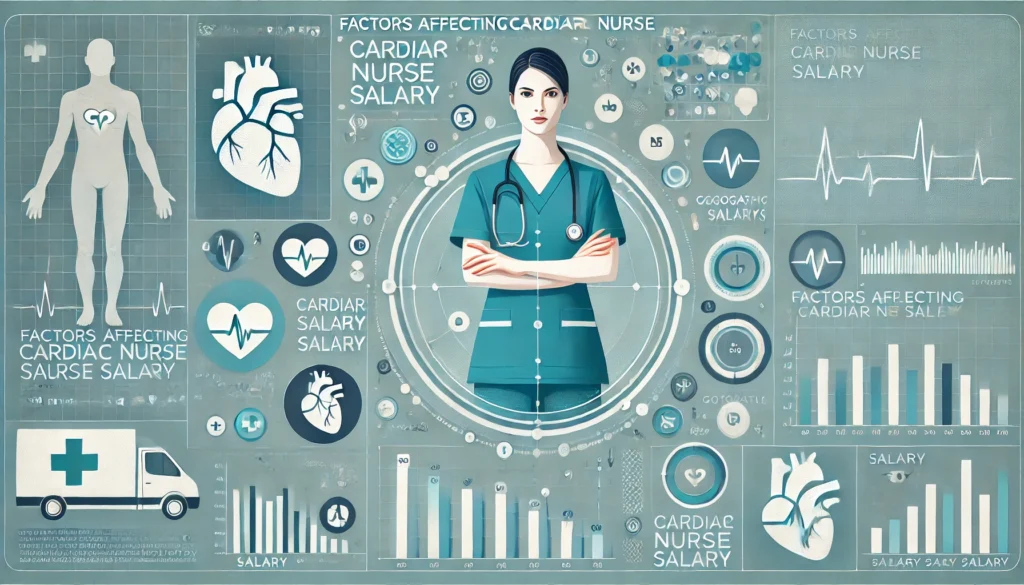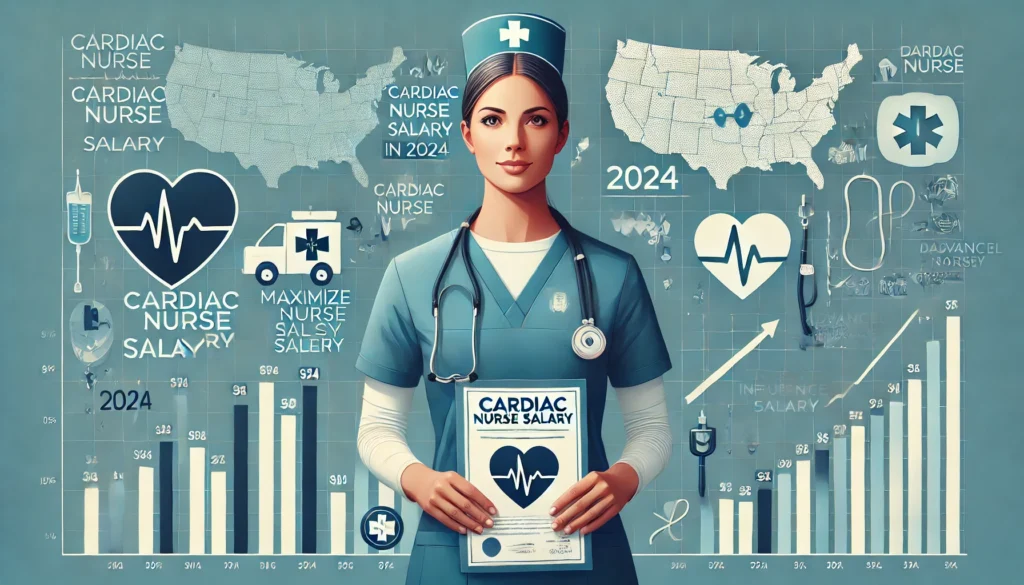What is the True Potential of a Cardiac Nurse Salary in the US? Cardiac nurses play a vital role in caring for patients with heart conditions like heart disease and arrhythmias. Salaries for cardiac nurses vary based on location, experience, education, and certifications.
This guide breaks down average salaries, key factors influencing pay, and tips to boost your income. Whether starting out or an experienced nurse, you’ll find strategies to help you grow your career and maximize your earnings.

Understanding the Average Cardiac Nurse Salary in the US
Cardiac nursing is a rewarding career in terms of job satisfaction and financial compensation. According to the Bureau of Labor Statistics (BLS), the median annual salary for registered nurses (RNs) in the United States is around $77,600. However, the salary for a cardiac nurse can vary significantly based on several factors, including location, experience, and the specific healthcare setting they work in.
What is the Average Salary for Cardiac Nurses?
The average salary for a cardiac nurse typically ranges from $70k to $120k per year, depending on experience, education, and job location. Entry-level cardiac nurses can expect to earn between $60k to $80k, while those with 5-10 years of experience might earn between $80k to $100k. More experienced cardiac nurses, especially those in specialized roles, can earn $100k annually.
Factors like certifications in specialized areas of cardiac care, such as Critical Care Registered Nurse (CCRN) or Cardiovascular Nurse (CVN), can further boost these figures.
Regional Differences in Cardiac Nurse Salaries
Geographic location plays a significant role in determining a cardiac nurse’s salary. Areas with a higher cost of living or greater demand for specialized healthcare professionals often offer higher salaries. For example, cardiac nurses in urban areas such as New York City, San Francisco, and Los Angeles tend to earn higher salaries than those in rural areas.
Here’s a breakdown of some key cities with higher cardiac nurse salaries:
- New York City: $95,000 – $125,000
- Los Angeles: $90,000 – $115,000
- Chicago: $85,000 – $110,000
- Houston: $80,000 – $100,000
In contrast, rural areas in states like Mississippi, Alabama, or West Virginia may offer lower salaries, often ranging from $60k to $85k annually.

Factors that Influence Cardiac Nurse Pay
While salary data offers a general idea of what to expect, several factors can influence your earning potential as a cardiac nurse. These factors include geographic location, experience level, certifications, and education. Understanding how each factor impacts your salary can help you take targeted steps to increase your earning potential.
Geographic Location and Its Impact on Salary
The cost of living and demand for specialized nurses vary by state and city, impacting the salary of cardiac nurses. States with high healthcare needs or a large population of elderly patients, such as California, Florida, and Texas, tend to pay more to attract skilled cardiac nurses.
Additionally, urban hospitals generally pay more than rural hospitals, though rural facilities often offer other benefits such as better work-life balance and lower living costs. As a result, location is one of the most significant factors influencing a cardiac nurse’s salary.
The Role of Certifications and Specializations in Earning More
Earning specialized certifications in cardiac care is another way to increase your earning potential. For example, the Critical Care Registered Nurse (CCRN) certification can significantly boost your salary. Cardiac nurses who hold a CCRN certification often earn between $10k to $20k more annually compared to their non-certified peers.
Additional certifications include:
- Cardiovascular Nursing Certification (CVN)
- American Heart Association (AHA) Advanced Cardiovascular Life Support (ACLS)
- Certified Cardiac Surgery Nurse (CCRN-BC)
Specializing in specific areas of cardiac care, such as catheterization or heart failure management, can also increase your earning potential. These advanced certifications and specializations demonstrate your expertise, making you eligible for more senior roles with higher salaries.
The Influence of Education on Cardiac Nurse Salaries
Education is another key factor influencing cardiac nurse salaries. A nurse’s level of education can directly impact their pay scale. Registered nurses with a Bachelor of Science in Nursing (BSN) typically earn more than those with an Associate Degree in Nursing (ADN). Nurses with an MSN (Master of Science in Nursing) or a Doctor of Nursing Practice (DNP), especially those pursuing careers as nurse practitioners, can expect a significant salary increase.
Nurses with higher education are often eligible for leadership roles, such as nurse manager or director of cardiac services, with higher compensation packages.

Maximizing Your Earning Potential as a Cardiac Nurse
As with any profession, there are several strategies you can use to maximize your salary as a cardiac nurse. Investing in your education, acquiring additional certifications, and taking on more responsibilities can increase your earning potential over time. Below are some practical steps to help you earn more as a cardiac nurse.
Pursuing Advanced Education to Boost Earnings
One of the most effective ways to increase your earning potential as a cardiac nurse is to pursue higher education. A BSN is often the minimum requirement for most nursing roles. However, many hospitals and healthcare employers are now prioritizing nurses with an MSN or Doctor of Nursing Practice (DNP).
Advanced degrees, such as a Nurse Practitioner (NP) certification focusing on cardiology, can substantially increase your earning potential. Cardiology nurse practitioners can earn $100,000 to $150,000 annually, depending on their location and level of experience.
Acquiring Certifications for Higher Pay
Certifications are another powerful way to increase your salary. Critical care and cardiovascular care certifications, like the CCRN and CVN, can increase your salary by thousands of dollars annually. They can also help you stand out in the job market and qualify for more advanced roles.
Moreover, completing continuing education courses and staying up-to-date with the latest advances in cardiac care will demonstrate your commitment to professional growth. This can increase your chances of promotion and salary raises.
Transitioning to a Cardiac Nurse Practitioner (NP) Role
For registered nurses interested in taking their career to the next level, becoming a Cardiac Nurse Practitioner (NP) is one of the most lucrative options. Cardiology nurse practitioners manage various cardiovascular conditions and often earn significantly higher salaries than RNs.
Cardiac NPs can work in hospitals, private practices, or outpatient clinics. In addition to higher pay, this role offers more autonomy, greater job satisfaction, and leadership opportunities (Visit our comprehensive guide to healthcare leadership salaries to learn more about salary expectations and career growth opportunities in healthcare leadership).
Career Advancement Tips for Cardiac Nurses
To further maximize your career potential as a cardiac nurse, consider these career advancement strategies.
Networking and Professional Development for Better Opportunities
Networking is a powerful tool for advancing your career and earning potential. Attend conferences and workshops hosted by organizations like the American Heart Association (AHA) or American Nurses Association (ANA). Networking with other professionals in the field can open doors to better job opportunities and higher-paying roles.
Joining professional organizations also gives you access to resources, such as job boards, continuing education, and mentorship programs, which can help you grow your career.
Discover tips on building a strong healthcare network that supports your professional advancement.
How to Move Up the Ladder in Cardiac Nursing
Moving into leadership roles in cardiac nursing is another way to increase your salary. Nurse managers, directors of nursing, and other leadership positions often come with higher salaries, increased benefits, and more influence in healthcare decision-making.
To advance to a leadership position, consider pursuing nursing leadership or management courses. Many advanced nursing programs now offer specializations in healthcare management, which will help you move into managerial roles and boost your earning potential.
Visit our comprehensive guide to healthcare leadership salaries to learn more about salary expectations and career growth opportunities in healthcare leadership.
Building a Personal Brand to Attract Better Opportunities
Building a personal brand can be an effective way to attract higher-paying opportunities. By showcasing your expertise on professional platforms such as LinkedIn, publishing articles, or presenting at conferences, you can position yourself as a thought leader in cardiac nursing. A strong personal brand can lead to job offers from top employers and higher-paying positions.

Conclusion
Cardiac nursing offers both personal and financial rewards. Understanding salary factors and advancing your education, certifications, and experience can boost your earning potential. Whether you’re new or experienced, there are plenty of opportunities for growth and higher pay in this field.
Table with Trusted Sources
| Source | Information Provided |
|---|---|
| Bureau of Labor Statistics (BLS) | National average salary for registered nurses (RNs), including cardiac nurses. |
| PayScale | Salary data for specific nursing roles, including cardiac nursing. |
| U.S. News & World Report | Healthcare salary trends, including cardiac nursing compensation. |
| Indeed.com | Job listings and salary ranges for cardiac nurses across the US. |
| American Nurses Association (ANA) | Resources on salary and career growth opportunities for nurses. |
This table includes reliable sources like the Bureau of Labor Statistics, PayScale, and U.S. News, which provide accurate data about nursing salaries, including those in the cardiac specialty.
For a detailed look at related roles, such as EKG technician salaries, check out this comprehensive guide.
FAQ Section
Q1: What is the average salary for a cardiac nurse in the US?
Cardiac nurses in the US typically earn between $70,000 and $120,000 annually, depending on experience, location, and healthcare setting.
Q2: How do certifications affect a cardiac nurse’s salary?
Certifications like CCRN or CVN can increase salaries by $10,000 to $20,000, signaling expertise and eligibility for higher-paying roles.
Q3: Does location impact cardiac nurse salary?
Yes, areas with high demand, like California, NY, or Texas, often offer higher salaries due to the cost of living and competition for specialized roles.
Q4: Can advanced education boost my salary?
Earning a BSN, MSN, or becoming a Cardiac NP can open doors to higher-paying leadership or specialized positions.
Q5: What other factors affect a cardiac nurse’s salary?
Experience, job role (e.g., staff nurse vs. nurse practitioner), and type of facility (hospital vs. clinic) all influence salary levels.







